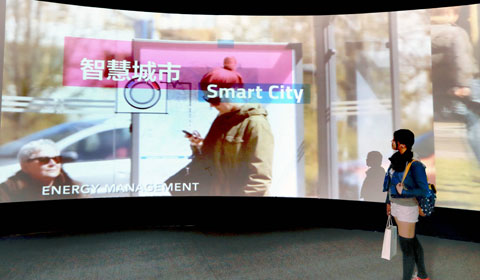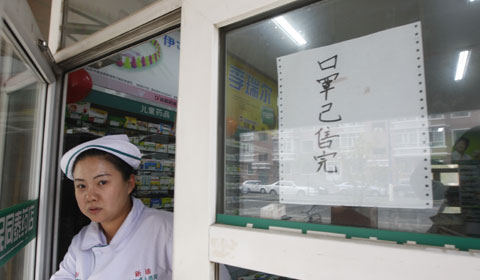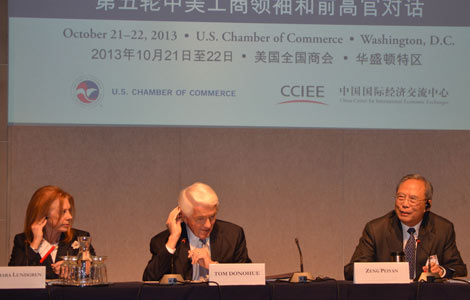Big hopes on Third Plenum for reform
Updated: 2013-10-21 07:06
By Ed Zhang (China Daily USA)
|
||||||||
Bourses in Shanghai, Hong Kong and Shenzhen would probably enjoy a period of robust business in the run-up to Beijing's major high-level conference to decide China's next round of reforms, which is scheduled for mid-November.
The conference is called the Third Plenum of 2013, which is the short form of a very long name: The Third Plenary Session of the 18th Central Committee of the Communist Party of China.
It was the Third Plenum of 1978 that initiated the economy's structural reform. So it is both ritualistically and realistically important to dedicate every Third Plenum (recurring usually every five years) to the sacred cause of reform. And the most convincing way to do it is to inject fresh ideas into a new reform program.
Members of China's present leadership nucleus, especially President Xi Jinping and Premier Li Keqiang, have pledged repeatedly that they will make a good effort at reform.
Expectation is running high that the 2013 Third Plenum will result in much stronger headway for reform than people can remember seeing in the past decade.
In the short term, things may get really exciting, especially as the economy's third-quarter results, released on Friday, showed better growth in industry, investment and retail than in the previous two quarters.
In the longer term, however, not all industries will post equally exciting results. Picking worthy investment targets will remain a tricky game.
The "economic transition" that the government talks about is not just a slogan. It is a reality based on the fact that the previous way of building up the economy, which relied on heavy energy and heavy investment, has simply run to the wall or, as described by Chinese officials themselves, has become unsustainable.
What transition means for the stock market is probably that many existing listed companies are going to suffer, rather than benefit, from the reforms that will follow the Third Plenum.
For example, the capacity of the steel industry based in Hebei, a province of less than 0.2 million square kilometers, has exceeded that of the entire United States, a country of 9.6 million sq km. And that is not a record to boast of. The density of all related industrial discharge is one source of the ugly and unhealthy choking smog that from time to time envelops the North China plain, including the national capital Beijing.
The National Development and Reform Commission, the top regulator, has already ordered several heavy industries, steel-making included, to cut their production capacity.
The governor of Hebei would be racking his brain to find ways to relocate the workforce to be made redundant by the partial shut-down of the province's steel industry, while also maintaining its general GDP growth.
More than ever, high-growth industries will need to feature light assets, low demand for energy and materials, extensive networks and services, more mid- or high-skilled jobs and good integration with international standards. Many existing listed companies, especially State-owned industrial corporations, will have inherent difficulties adapting to the transition unless they are placed under very intelligent, market-toughened leaders.
In the meantime, high-growth cities will no longer feature big smoke-stack industries, but more probably clusters of small enterprises in diverse services, young entrepreneurs and talented people from other provinces and perhaps overseas, moderate housing prices, decent utilities and environmentally friendly planning and implementation of urban development programs.
An economy's transition is first of all a result of competition in the marketplace. But it can be quickened by government decrees. We are seeing signs of both factors working together now. After the Third Plenum, we will be seeing even more.
The author is editor-at-large of China Daily. Contact the writer at edzhang@chinadaily.com.cn.
(China Daily USA 10/23/2013 page12)
 Pumpkin fun ahead of Halloween
Pumpkin fun ahead of Halloween
 Weakening Raymond soaks Mexico, no serious damage
Weakening Raymond soaks Mexico, no serious damage Apple unveils new Macs, iPad ahead of holidays
Apple unveils new Macs, iPad ahead of holidays
 Smart cities to aid urbanization
Smart cities to aid urbanization
 In control & breaking the mold
In control & breaking the mold
 Higher retirement age may help solve pension problem
Higher retirement age may help solve pension problem
 Northeast remains shrouded in smog for third straight day
Northeast remains shrouded in smog for third straight day
 Beijing Opera troupe perform in Brazil
Beijing Opera troupe perform in Brazil
Most Viewed
Editor's Picks

|

|

|

|

|

|
Today's Top News
Top officials promote new power relations
Iowa, Hebei 'sister' visit wraps up
Yingli uses US sports stars in campaign
NASA: Chinese scientists not banned
China's US Treasury holdings hit six-month low
Graduate looks at kung fu-hip hop connection
Apple unveils new Macs, iPad
San Francisco train service restarts after strike
US Weekly

|

|







